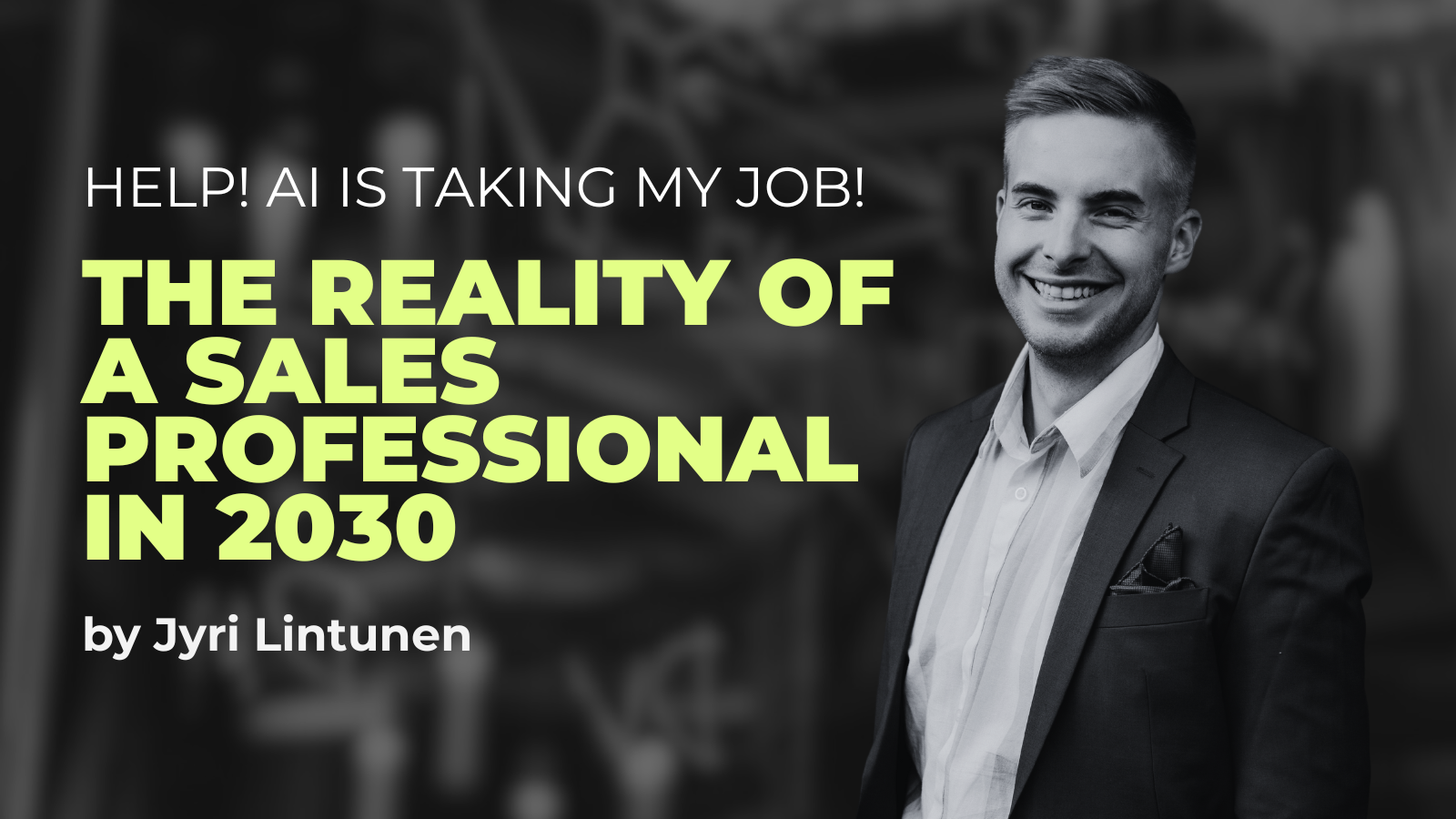Share to gain more social capita
Written by — Jyri Lintunen, Head of New Business

Will AI take your sales job? No, but a salesperson using AI might. Learn how to stay relevant in sales by combining human strengths with smart automation.
Written by — Jyri Lintunen, Head of New Business
Share to gain more social capita
There’s a popular sci-fi story where AI takes over everything, all human work disappears, and we’re left lounging around enjoying endless rewards… Yeah, not quite.
In reality, AI is steadily finding its way into more and more areas of work, and sales is no exception. There’s a flood of AI use cases out there, but not all fits every organization.

Did AI enable Jyri to just reap its benefits and lounge around all day? Nah, he was just working remotely for a week.
Spara has built AI conversation agents (via chat, voice, or email) that qualify leads, answer questions, and book meetings, leaving humans to handle only the final stage of the sales process.
AI voice agents can call through massive contact lists, handle objections, ask qualifying questions, and guide a call toward a specific goal, like booking a demo or a meeting.
Not too common in Finland, mainly because of the tricky language and smaller scale. Personally, I wouldn’t love a bot making calls in my name either.
Proposal automation powered by AI can fill out large parts of complex RFPs using a company’s internal documentation and knowledge base, which dramatically reduces manual work.
This one’s a no-brainer. It’s one of the most common and high-ROI use cases, and something we’re actively building at Recordly.

At the Microsoft AI Tour Helsinki earlier this year.
When the giants move, the rest follow
Salesforce, for instance, recently cut 4,000 support roles, replacing parts of that work with AI agents. While that example comes from customer support, it illustrates how AI can step in to handle areas that once required a human touch.
It might be tempting, in the short term, to think about replacing expensive salespeople with smart, obedient AI systems. But that’s easier said than done. Personally, I find overly automated, inhuman sales funnels off-putting. Who can you really trust if you’re only ever talking to a machine?
You can’t bury your head in the sand and keep using 1990s methods hoping for better results. To stay relevant, you need to embrace AI, and at the same time, double down on your uniquely human strengths.
Here are a few of those strengths worth mastering:
ExpertiseMachines struggle to grasp the complex web of human relationships, history, and context that shape business decisions. Your hard-earned experience helps you understand the logic and quirks of your customers’ industries; something AI can’t fake.
Trust doesn’t grow from scripts or data points. It’s built through consistent, genuine interactions. Clients buy from people they believe in; those who’ve proven themselves reliable and trustworthy over time.
The power of storytelling
Sales is more than just about facts and figures. It’s about telling stories that make customers feel something. A good story connects your product or service to the customer’s own journey: their challenge, their realization, and their success. Stories make the complex understandable and the abstract tangible.

How could AI replace listening and learning from customers over dinner?
Below are a few areas where AI can truly make your life easier but without losing the human touch.
Automated lead generation and preparing: Prospecting and meeting prep can be tough. Even bouncing ideas off a language model about your upcoming call is a step in the right direction. With AI-assisted research, you might uncover company- or industry-specific insights that would’ve otherwise gone unnoticed.
Meeting notes: I’ve stopped writing long summaries myself. The machine handles that now. I only jot down a few keywords. This way, I can focus 100% on the conversation. And let’s be honest, no one likes talking to someone who spends half the meeting scribbling instead of listening.
Proposal drafts: If your AI has access to your past proposals (and they’re indexed smartly), you can easily pull together relevant sections from earlier work instead of reinventing the wheel. Bonus points if you’ve trained your AI to recognize which proposals were winners and which weren’t.

Photo from one of Jyri's many speaker gigs at tech-focused events - great places to meet clients.
The real question isn’t whether you should keep selling the old way or pull a Benioff and replace humans with AI. Either extreme will fail.
The only way to succeed in sales in the 2030s is to understand the different strengths of humans and machines and learn how to balance them. Automate what the machine does better. But never hand over what only humans can do best.
Those who master that balance will also master customer relationships. And that, naturally, leads to more sales.
And isn’t that what you wanted all along?